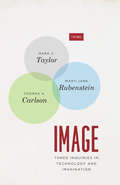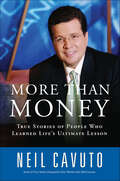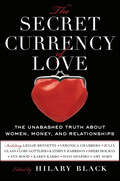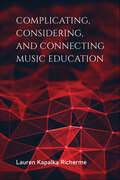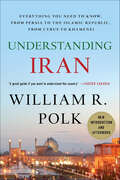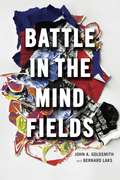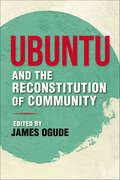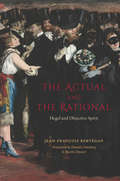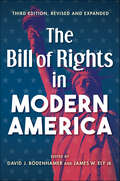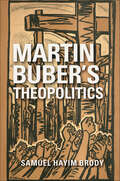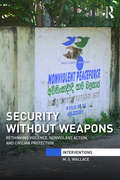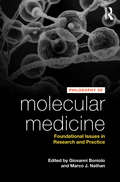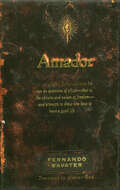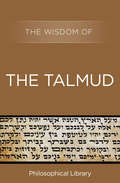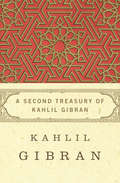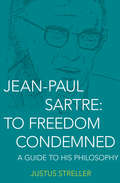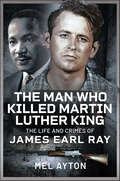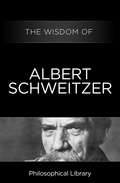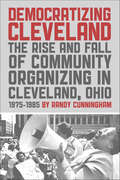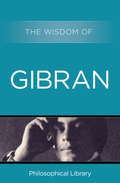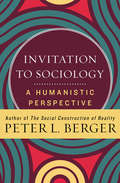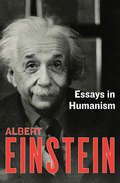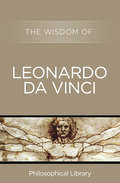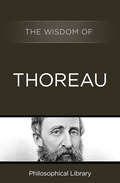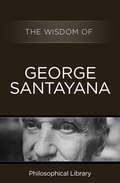- Table View
- List View
Image: Three Inquiries in Technology and Imagination (TRIOS)
by Thomas A. Carlson Mark C. Taylor Mary-Jane RubensteinThe three essays in Image, written by leading philosophers of religion, explore the modern power of the visual at the intersection of the human and the technological. Modern life is steeped in images, image-making, and attempts to control the world through vision. Mastery of images has been advanced by technologies that expand and reshape vision and enable us to create, store, transmit, and display images. The three essays in Image, written by leading philosophers of religion Mark C. Taylor, Mary-Jane Rubenstein, and Thomas A. Carlson, explore the power of the visual at the intersection of the human and the technological. Building on Heidegger’s notion that modern humanity aims to master the world by picturing or representing the real, they investigate the contemporary culture of the image in its philosophical, religious, economic, political, imperial, and military dimensions, challenging the abstraction, anonymity, and dangerous disconnection of contemporary images. Taylor traces a history of capitalism, focusing on its lack of humility, particularly in the face of mortality, and he considers art as a possible way to reconnect us to the earth. Through a genealogy of iconic views from space, Rubenstein exposes the delusions of conquest associated with extraterrestrial travel. Starting with the pressing issues of surveillance capitalism and facial recognition technology, Carlson extends Heidegger’s analysis through a meditation on the telematic elimination of the individual brought about by totalizing technologies. Together, these essays call for a consideration of how we can act responsibly toward the past in a way that preserves the earth for future generations. Attending to the fragility of material things and to our own mortality, they propose new practices of imagination grounded in love and humility.
More Than Money: True Stories of People Who Learned Life's Ultimate Lesson
by Neil CavutoIn this phenomenal New York Times bestseller, Neil Cavuto shares the inspirational stories of an array of personal heroes, many of whom motivated him to continue his career as he battled cancer and multiple sclerosis.Joining the nascent Fox News Channel in 1996, Neil was set to establish himself as one of business journalism's most important players. Ten years after being diagnosed with cancer, however, Cavuto was dealt another body blow: He was diagnosed with multiple sclerosis. As friends and strangers alike gathered to offer their support, he became attuned to the stories of others in the business world who also triumphed over serious setbacks of their own. More Than Money shares with us their personal stories, among them:Evelyn Lauder, the cosmetics executive who pioneered the pink ribbon campaign after her own battle with breast cancerRichard Branson, who overcame dyslexia and used his creativity and entrepreneurial spirit to build the Virgin empire Michael Wilson, a senior executive at the Royal Bank of Canada, who launched a public campaign to raise awareness of and money for treating depression after his son committed suicideJon Huntsman, who survived two bouts with cancer to build one of the largest petrochemical companies in the world and found one of the most prominent cancer research centersMoving, sincere, and wise, More Than Money profiles individuals whose stories are a testament to courage, compassion, and dignity in the face of adversity.
The Secret Currency of Love: The Unabashed Truth About Women, Money, and Relationships
by Hilary Black“Sex & The City meets The Wall Street Journal....Juicy, smart, dramatic and insightful—an addictive read.”—Beth Kobliner, author of Get a Financial Life: Personal Finance in Your Twenties and ThirtiesIn The Secret Currency of Love, edited by Hilary Black, acclaimed, bestselling, and award-winning women writers explore the fraught and powerful connections between love and money. As featured on the "Today Show"--with contributions by Karen Karbo, Kathryn Harrison, Lori Gottlieb, Julia Glass, Rebecca Traister, Dani Shapiro, Amy Sohn, and others--The Secret Currency of Love takes an unabashed look at relationships through the often-distorting lens of finance. As Elle magazine informs us, “All the bases are covered here, from the hard lessons women learn (and impart) to the inextricability of romance and cold hard cash.”
Complicating, Considering, and Connecting Music Education (Counterpoints: Music and Education)
by Lauren Kapalka RichermeIn Complicating, Considering, and Connecting Music Education, Lauren Kapalka Richerme proposes a poststructuralist-inspired philosophy of music education. Complicating current conceptions of self, other, and place, Richerme emphasizes the embodied, emotional, and social aspects of humanity. She also examines intersections between local and global music making. Next, Richerme explores the ethical implications of considering multiple viewpoints and imagining who music makers might become. Ultimately, she offers that music education is good for facilitating differing connections with one's self and multiple environments. Throughout the text, she also integrates the writings of Gilles Deleuze and Félix Guattari with narrative philosophy and personal narratives. By highlighting the processes of complicating, considering, and connecting, Richerme challenges the standardization and career-centric rationales that ground contemporary music education policy and practice to better welcome diversity.
Understanding Iran: Everything You Need to Know, from Persia to the Islamic Republic, from Cyrus to Khamenei
by William R. PolkWilliam R. Polk provides an informative, readable history of a country which is moving quickly toward becoming the dominant power and culture of the Middle East. A former member of the State Department's Policy Planning Council, Polk describes a country and a history misunderstood by many in the West. While Iranians chafe under the yolk of their current leaders, they also have bitter memories of generations of British, Russian and American espionage, invasion, and dominance. There are important lessons to be learned from the past, and Polk teases them out of a long and rich history and shows that it is not just now, but for decades to come that an understanding of Iran will be essential to American safety and well-being.
Battle in the Mind Fields
by John A. Goldsmith Bernard Laks“We frequently see one idea appear in one discipline as if it were new, when it migrated from another discipline, like a mole that had dug under a fence and popped up on the other side.” Taking note of this phenomenon, John Goldsmith and Bernard Laks embark on a uniquely interdisciplinary history of the genesis of linguistics, from nineteenth-century currents of thought in the mind sciences through to the origins of structuralism and the ruptures, both political and intellectual, in the years leading up to World War II. Seeking to explain where contemporary ideas in linguistics come from and how they have been justified, Battle in the Mind Fields investigates the porous interplay of concepts between psychology, philosophy, mathematical logic, and linguistics. Goldsmith and Laks trace theories of thought, self-consciousness, and language from the machine age obsession with mind and matter to the development of analytic philosophy, behaviorism, Gestalt psychology, positivism, and structural linguistics, emphasizing throughout the synthesis and continuity that has brought about progress in our understanding of the human mind. Arguing that it is impossible to understand the history of any of these fields in isolation, Goldsmith and Laks suggest that the ruptures between them arose chiefly from social and institutional circumstances rather than a fundamental disparity of ideas.
Ubuntu and the Reconstitution of Community (World Philosophies)
by Edited by James OgudeUbuntu is premised on the ethical belief that an individual's humanity is fostered in a network of human relationships: I am because you are; we are because you are. The essays in this lively volume elevate the debate about ubuntu beyond the buzzword it has become, especially within South African religious and political contexts. The seasoned scholars and younger voices gathered here grapple with a range of challenges that ubuntu puts forward. They break down its history and analyze its intellectual surroundings in African philosophical traditions, European modernism, religious contexts, and human rights discourses. The discussion embraces questions about what it means to be human and to be a part of a community, giving attention to moments of loss and fragmentation in postcolonial modernity, to come to a more meaningful definition of belonging in a globalizing world. Taken together, these essays offer a rich understanding of ubuntu in all of its complexity and reflect on a value system rooted in the everyday practices of ordinary people in their daily encounters with churches, schools, and other social institutions.
The Actual and the Rational: Hegel and Objective Spirit
by Jean-François KervéganOne of Hegel’s most controversial and confounding claims is that “the real is rational and the rational is real.” In this book, one of the world’s leading scholars of Hegel, Jean-François Kervégan, offers a thorough analysis and explanation of that claim, along the way delivering a compelling account of modern social, political, and ethical life. ?Kervégan begins with Hegel’s term “objective spirit,” the public manifestation of our deepest commitments, the binding norms that shape our existence as subjects and agents. He examines objective spirit in three realms: the notion of right, the theory of society, and the state. In conversation with Tocqueville and other theorists of democracy, whether in the Anglophone world or in Europe, Kervégan shows how Hegel—often associated with grand metaphysical ideas—actually had a specific conception of civil society and the state. In Hegel’s view, public institutions represent the fulfillment of deep subjective needs—and in that sense, demonstrate that the real is the rational, because what surrounds us is the product of our collective mindedness. This groundbreaking analysis will guide the study of Hegel and nineteenth-century political thought for years to come.
The Bill of Rights in Modern America: Third Edition, Revised And Expanded
by David J. Bodenhamer and James W. ElyAs the 2020s began, protestors filled the streets, politicians clashed over how to respond to a global pandemic, and new scrutiny was placed on what rights US citizens should be afforded. Newly revised and expanded to address immigration, gay rights, privacy rights, affirmative action, and more, The Bill of Rights in Modern America provides clear insights into the issues currently shaping the United States. Essays explore the law and history behind contentious debates over such topics as gun rights, limits on the powers of law enforcement, the death penalty, abortion, and states' rights. Accessible and easy to read, the discerning research offered in The Bill of Rights in Modern America will help inform critical discussions for years to come.
Martin Buber's Theopolitics (New Jewish Philosophy and Thought)
by Samuel Hayim BrodyHow did one of the greatest Jewish thinkers of the 20th century grapple with the founding of Israel and the Israeli-Palestinian conflict—one of the most significant political conflicts of his time? Samuel Hayim Brody traces the development of Martin Buber's thinking and its implications for the Jewish religion, for the problems posed by Zionism, and for the Zionist-Arab conflict. Beginning in turbulent Weimar Germany, Brody shows how Buber's debates about Biblical meanings had concrete political consequences for anarchists, socialists, Zionists, Nazis, British, and Palestinians alike. Brody further reveals how Buber's passionate commitment to the rule of God absent an intermediary came into conflict in the face of a Zionist movement in danger of repeating ancient mistakes. Brody argues that Buber's support for Israel stemmed from a radically rich and complex understanding of the nature of the Jewish mission on earth that arose from an anarchist reading of the Bible.
Security Without Weapons: Rethinking violence, nonviolent action, and civilian protection (Interventions)
by M. S. WallaceFew questions of global politics are more pressing than how to respond to widespread violence against civilians. Despite the efforts of Responsibility to Protect (R2P) proponents to draw attention away from exclusively military responses, debates on humanitarian intervention and R2P’s “Third Pillar” still tend to boil down to two unsatisfying options: stand by and “do nothing” or take military action to protect civilians – essentially using violence to stop violence. Accordingly – and given disagreement and uncertainty regarding moral claims, as well as the unpredictability of military effectiveness – this book asks: how can we counter violence ethically and effectively, taking action consistent with our particular moral commitments while also nurturing difference and enacting responsibility towards multiple others?After evaluating the pragmatic and ethical failings of military action, the book proposes nonviolent intervention as a third – unarmed, on-the-ground – option for protecting civilians during humanitarian crises. In the empirical section of the book, focusing on the discursive and psychological conditions enabling violence, Wallace analyses the mechanisms by which Nonviolent Peaceforce – an international NGO engaged in nonviolent intervention/ unarmed civilian peacekeeping (UCP) – was able to protect civilians and prevent violence, even if on a limited scale, in the broader context of Sri Lanka’s war/counterinsurgency in 2008.Both philosophically innovative and practically useful to those working in the field, the book contributes to a range of literatures and debates: from just war theory and poststructuralist ethics to nonviolent action and conflict transformation, and from humanitarian intervention, R2P, and civilian protection to strategic theory and discursive and psychological theories of violence.
Philosophy of Molecular Medicine: Foundational Issues in Research and Practice
by Giovanni Boniolo Marco J. NathanPhilosophy of Molecular Medicine: Foundational Issues in Theory and Practice aims at a systematic investigation of a number of foundational issues in the field of molecular medicine. The volume is organized around four broad modules focusing, respectively, on the following key aspects: What are the nature, scope, and limits of molecular medicine? How does it provide explanations? How does it represent and model phenomena of interest? How does it infer new knowledge from data and experiments? The essays collected here, authored by prominent scientists and philosophers of science, focus on a handful of mainstream topics in the philosophical literature, such as causation, explanation, modeling, and scientific inference. These previously unpublished contributions shed new light on these traditional topics by integrating them with problems, methods, and results from three prominent areas of contemporary biomedical science: basic research, translational and clinical research, and clinical practice.
Amador: A Father Talks To His Son About Happiness, Freedom, And Love
by Fernando SavaterIn a series of letters to his son, the renowned Spanish philosopher delivers sage advice on living an ethical life in today’s world.One of Europe’s foremost ethicists, Fernando Savater presents a deeply personal inquiry into the art of living well—one addressed to his own teenage son, Amador. In a series of personal letters, Savater encourages his son to recognize his own agency and use it responsibly, to think freely, and to make decisions that are both well-reasoned and empathetic. Amador is a heartfelt and enlightening primer for modern life, and an inspiration for any parent wishing to impart wisdom to their children.
The Wisdom of the Talmud: The Wisdom Of The Torah, The Wisdom Of The Talmud, The Wisdom Of The Koran, The Wisdom Of Muhammad, And The Wisdom Of Buddha (Wisdom)
by The Wisdom SeriesDiscover the ancient wisdom and historical influence of a cornerstone of Judaism The Wisdom of the Talmud presents a thorough history and overview of the Talmud, the rabbinical commentary on the Torah that was developed in the Jewish academies of Palestine and Babylonia. From the close of the Biblical canon to the end of the fifth century, Jewish scholars studied the scripture and worked to develop—and debate—supplementary understandings of the Torah&’s directions on a variety of topics. From man&’s purpose and miracles, to marriage and wellness, to consciousness and community, the Talmud considers what it means to practice faith on a daily basis and through a changing world. This book is an essential and approachable guide for understanding how interpretation of the Torah has guided Jewish life for thousands of years. This ebook features a new foreword, image gallery, and list of proverbs and sayings of the rabbis.
A Second Treasury of Kahlil Gibran
by Kahlil GibranWorks on joy and sorrow, life and love, by Kahlil Gibran, one of the most celebrated modern philosophersIn this magnificent volume, Gibran&’s writings have been translated from their native Arabic to English by Anthony Rizcallah Ferris. The collection includes The Broken Wings, an exquisitely tender, poetic love story; The Voice of the Master, a remarkable study of life; and Thoughts and Meditations, containing Gibran&’s spiritual message to the world. Each work, studded with gems of wisdom and truth, adds up to a warm, lively, and philosophical portrait of one of the twentieth century&’s greatest poetic masters.
Jean-Paul Sartre: A Guide to His Philosophy
by Justus StrellerJean-Paul Sartre&’s most influential existentialist work, Being and Nothingness, broken down into its most fertile ideas In To Freedom Condemned, Sartre&’s most influential work, Being and Nothingness, is laid bare, presenting the philosopher&’s key ideas regarding existentialism. Covering the philosophers Hegel, Heidegger, and Husserl, and mulling over such topics as love, God, death, and freedom, To Freedom Condemned goes on to consider Sartre&’s treatment of the complexities around human existence.
The Man Who Killed Martin Luther King: The Life and Crimes of James Earl Ray
by Mel AytonDoubts about James Earl Ray, Dr. Martin Luther King’s lone assassin, arose almost immediately after the civil rights leader was fatally shot on the balcony of the Lorraine Motel in Memphis on 4 April 1968. From the start, his aides voiced suspicions that a conspiracy was responsible for their leader’s death. Over time many Americans became convinced the government investigations covered up the truth about the alleged assassin. Exactly what led Ray to kill King continues to be a source of debate, as does his role in the murder. However, Mel Ayton believe the answers to the many intriguing questions about Ray and how conspiracy ideas flourished can now be fully understood. Missing from the wild speculations over the past fifty-two years has been a thorough investigation of the character of King’s assassin. Additionally, the author examines exactly how the conspiracy notions came about and the falsehoods that led to their promulgation. The Man Who Killed Martin Luther King is the first full account of the life of James Earl Ray based on scores of interviews provided to government and non-government investigators and from the FBI’s and Scotland Yard’s files plus the recently released Tennessee Department of Corrections prison record on Ray. Most importantly, the testimony of Anna Sandhu has often been ignored by writers but her story is crucial in gaining an understanding of Ray’s deceptive ways. A courtroom artist, who, after listening to Ray’s story, later married him. Also missing from accounts of the alleged ‘conspiracy’ is the story told to this author by Brushy Mountain State Penitentiary Deputy Warden Rolland H. Cisson, which decisively renders Ray’s claims of innocence to be bogus. In the short-lived freedom he acquired after escaping from the Missouri State Penitentiary in 1967, following being sentenced to twenty years in prison for repeated offenses, he traveled to Los Angeles and decided to seek notoriety as the one who would stalk and kill Dr. King, who he had come to hate vehemently. From the time of King’s murder, the reader will follow Ray to solitary confinement in a Nashville prison. Then, six years later, on 10 June 1977, James Earl Ray again escaped from prison, this time with five others. Ray was the last to be recaptured, having survived only on wheatgerm. Finally, the book relays Ray’s stabbing by several black inmates, then his resulting diagnosis with Hepatitis C, which caused his death twelve years later, in 1998.
The Wisdom of Albert Schweitzer (Wisdom)
by The Wisdom SeriesReverence for Life—Albert Schweitzer&’s pivotal philosophyMusician, physician, humanitarian, and philosopher, Albert Schweitzer was a twentieth-century Renaissance man who won the Nobel Peace Prize for his &“Reverence for Life&” philosophy. The Wisdom of Albert Schweitzer explores this core philosophy, which inspired one of the world&’s great humanitarians. While traveling in Africa, Schweitzer recognized that all living creatures have a will to live and believed that through a &“reverence for life&” mankind had an ethical imperative to aid in the welfare of all living things, including the environment. His words have remained an inspiration for generations of humanitarians and environmentalists.
Democratizing Cleveland: The Rise and Fall of Community Organizing in Cleveland, Ohio 1975–1985
by Randy CunninghamA trenchant history of Cleveland&’s community organizing movements, detailing their origins, campaigns, and legacies. Randy Cunningham, a founding member of the Cuyahoga County Progressive Caucus, spent nearly fifteen years researching grassroots efforts that put neighborhood concerns and voices front and center. In Democratizing Cleveland, he chronicles one of the greatest examples of mass civic and democratic education in Cleveland&’s history. The decade between 1975 and 1985 was a thriving period of social movements and community groups built around civil disobedience. Many of these groups, led by women, were able to unite white and black neighborhoods in a common cause. Cunningham introduces readers to the various groups and the causes they took on, covering topics such as: Insurance and bank redlining Community development and urban renewal programs The movement&’s decline during the Reagan administration
The Wisdom of Gibran (Wisdom)
by The Wisdom SeriesAn A-to-Z guide to the mystic poet&’s maxims and aphorisms An early twentieth-century Lebanese-American writer, Khalil Gibran instilled his poetry and art with his experiences in both the East and West. This selection of quotes, maxims, and aphorisms is drawn from such poems as &“Secrets of the Heart,&” &“Spirits Rebellious,&” and &“Broken Wings,&” as well as from his autobiography and essays. Gibran&’s words express a strong spirituality and mysticism and his voice offers a direct and at times optimistic view of the brotherhood of man. Addressing everything from love and death to Jesus, motherhood, and nature, Gibran&’s wisdom remains thought provoking and inspirational.
Invitation to Sociology: A Humanistic Perspective
by Peter L. BergerThe most popularly read, adapted, anthologized, and incorporated primer on sociology ever written for modern readers Acclaimed scholar and sociologist Peter L. Berger lays the groundwork for a clear understanding of sociology in his straightforward introduction to the field, much loved by students, professors, and general readers. Berger aligns sociology in the humanist tradition—revealing its relationship to the humanities and philosophy—and establishes its importance in thinking critically about the modern world. Throughout, Berger presents the contributions of some of the most important sociologists of the time, including Max Weber, Émile Durkheim, Vilfredo Pareto, and Thorstein Veblen.
Essays in Humanism
by Albert EinsteinThe great thinker reflects on such topics as nuclear weapons, world poverty, and international affairs in this Wall Street Journal bestseller. Nuclear proliferation, Zionism, and the global economy are just a few of the insightful and surprisingly prescient topics scientist Albert Einstein discusses in this volume of collected essays from between 1931 and 1950. Written with a clear voice and a thoughtful perspective on the effects of science, economics, and politics in daily life, Einstein&’s essays provide an intriguing view inside the mind of a genius addressing the philosophical challenges presented during the turbulence of the Great Depression, the Second World War, and the dawn of the Cold War.This authorized ebook features rare photos and never-before-seen documents from the Albert Einstein Archives at the Hebrew University of Jerusalem.
The Wisdom of Leonardo da Vinci (Wisdom)
by The Wisdom SeriesAn intriguing look inside the mind of the Renaissance genius Leonardo da Vinci stood on a bridge between medieval thought and the modern mind. In this selection of entries from his dozens of coded notebooks and unpublished manuscripts, his unending curiosity in the universe and deep knowledge come through in his energetic style. The self-educated da Vinci developed a philosophical system that set him apart from his contemporaries and marked him as the oracle of a new age, and his vivid imagination and straightforward writing style capture the reader&’s attention whether he is writing about his scientific analysis, his opinion of necromancy, discoveries in nature, or the nature of man. Accompanied by a thorough introduction, The Wisdom of Leonardo da Vinci unveils the man&’s deepest thoughts and musings and proves why he remains an intriguing and enduring figure.
The Wisdom of Thoreau (Wisdom)
by The Wisdom SeriesA collection of wise words on solitude, simplicity, nature, and life at Walden from the leader of the transcendentalist movement. In excerpts collected here from his most important works, Henry David Thoreau documents his experiences in nature and the wisdom he finds in his explorations of sound, reading, solitude, and other aspects of leading a simple life at Walden. A fearless individualist, Thoreau explored not only poetic naturalism but also a number of ideas that were groundbreaking for his day, including civil disobedience and environmentalism. This introduction to one of America&’s great thinkers shows that as an essayist and poet-philosopher Thoreau remains a relevant voice in the never-ending quest of man to understand his place in the natural terrain.
The Wisdom of George Santayana (Wisdom)
by The Wisdom SeriesA survey of the influential—and prolific—modern philosopher In dozens of books, magazine articles, and essays, George Santayana infused his philosophy with exquisite language, wit, and subtle humor, prompting one authority to state that he &“writes philosophy more beautifully than any other thinker since Plato.&” The Wisdom of George Santayana makes accessible both his ideas and his oft-quoted aphorisms on a variety of subjects including naturalism, creative imagination, and spirituality without dogma. Organized by books and essays, and highlighting key words and themes, this compilation is an excellent introduction to the man and his work.
